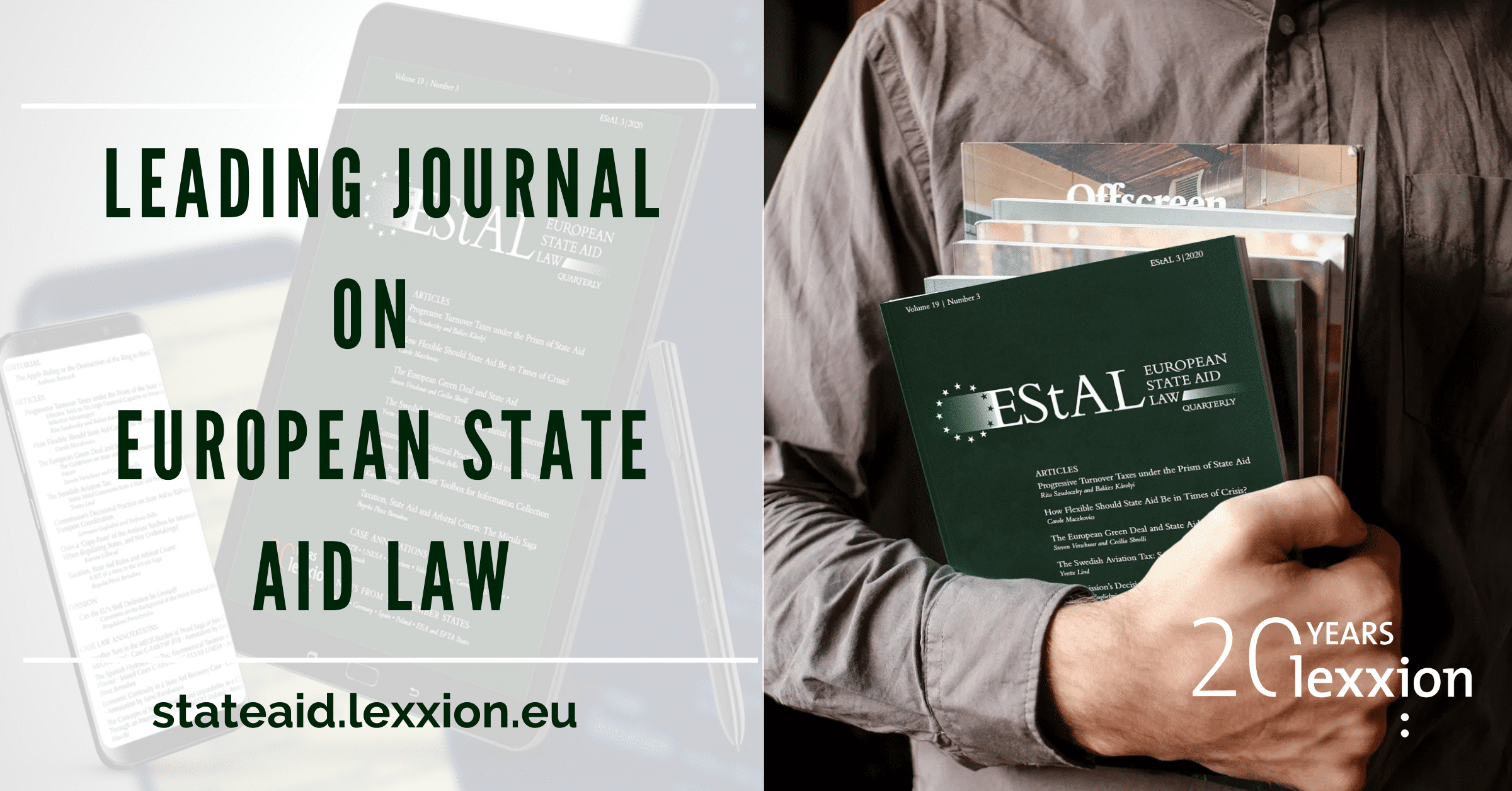
Member States abolish bilateral investment treaties between themselves.
When the Commission orders recovery of incompatible State aid, interest has to be added to the recoverable amount for the whole period of illegality regardless of any national limitation rules.
In 2018, Member States granted EUR 121 billion to industry and services, EUR 6.3 billion to agriculture and EUR 50 billion to railways.
Temporary Framework:
Number of approved covid-19 measures, as of 29 May 2020: 135*
Legal basis: Article 107(2)(b): 10; Article 107(3)(b): 116; Article 107(3)(c): 12
First recapitalisation measure implemented by Lithuania
* Excludes amendments to previously notified measures
Introduction
This week’s article deals with three distinct issues: investor-state arbitration; recovery of incompatible state; and the recently published 2019 edition of the State Aid Scoreboard.
i) Investor-state arbitration
When investors lodge claims against states and demand compensation for damage caused by changes in legislation or other public acts they often come up against the wall of State aid. Compensation is invariably State aid and it is rarely ever compatible with the internal market. The Court of Justice has ruled that investor-protection clauses in bilateral treaties between EU Member States are contrary to EU law [see C-478/07, Budějovický Budvar and C-284/16, Achmea].
Now, Member States have agreed to abolish such bilateral treaties between themselves. The agreement is published in the Official Journal on 29 May 2020.[1]
ii) Recovery
On 30 April 2020, the Court of Justice ruled in case C-627/18, Nelson Antunes da Cunha v Instituto de Financiamento da Agricultura e Pescas (IFAP).[2] A Portuguese court asked the Court of Justice for a preliminary ruling in a dispute concerning recovery of State aid amounting to EUR 15,000 from Nelson Antunes da Cunha.
Background
As explained in the introductory part of the judgment, between 1994 and 1996, Nelson Antunes da Cunha, an agricultural undertaking, was granted interest subsidies. Subsequently, the Commission in decision 2000/200 found the subsidies to constitute incompatible State aid and ordered Portugal to recover them. Despite several requests by the Portuguese authorities, Nelson Antunes da Cunha refused to repay the subsidies plus interest. Portugal has a general limitation period of five years. The referring national court requested guidance on the limitation period and clarification with respect to the ten-year limitation period in Article 17 of Regulation 2015/1589.
The ten-year period
The national court asked whether the ten-year limitation period applied only to the relations between the Commission and the Member State or also to the relations between Member States and the beneficiaries of incompatible aid.
The reply of the Court of Justice was that Article 17(1) of Regulation 2015/1589, which provides for a ten-year limitation period, applies exclusively to the powers of the Commission to order recovery of aid. [paragraph 30 of the judgment]
In fact, the Court of Justice had already answered this question in its judgment in the landmark case C-349/17, Eesti Pagar. This case was reviewed here on 26 March 2019.[http://stateaidhub.eu/blogs/stateaiduncovered/post/9468]
– Ad –
European State Aid Law (EStAL) provides you quarterly with a review of around 100 pages, containing articles, case studies, jurisdiction of both European and national courts as well as communications from the European Commission. EStAL covers all areas pertaining to EU State aid and subsidies, among others:
✓ The evolution of the concept of State aid;
✓ State aid Modernization;
✓ Services of General Economic Interest (SGEI);
✓ General Block Exemption Regulation (GBER);
✓ Judicial review of Commission Decisions;
✓ Economic assessment and evaluation;
✓ Enforcement at national level;
✓ Sectoral aid and guidelines.
Period in which interest is to be added to the recoverable amount
The national court asked whether Article 16(2) of Regulation 2015/1589, which adds interest to the aid to be recovered, precludes a national limitation period of less than ten years.
The Court of Justice first noted that Article 16(3) of Regulation 2015/1589 provides that the recovery of aid takes place in accordance with the procedures laid down in national law, as long as the decision of the Commission is immediately and effectively enforced. [paragraph 40]
It then recalled the well-established principle that the purpose of recovering illegally granted State aid is to eliminate the distortion of competition. Restoring the situation that existed prior to the payment of the illegal or incompatible aid is a prerequisite for maintaining the practical effectiveness of the provisions of the Treaty on State aid. [paragraph 42]
The obligation to recover is fulfilled only if the Member State concerned has indeed recovered the amount of the incompatible aid, including interest. [paragraph 43]
The purpose of the limitation period is generally to ensure legal certainty. [paragraph 44]
The confidence of the recipient companies in the legality of aid is justified only if, in principle, it is granted in accordance with Article 108(3) TFEU. A diligent entrepreneur must, under normal circumstances, be able to ascertain that the procedure in Article 108(3) TFEU is followed. When the aid is granted without prior notification to the Commission, the beneficiary of the aid may not have legitimate expectation as to the legality of aid. [paragraph 46]
Then the Court noted that from the information it had received from the referring national court, the interest due was calculated for five years because of the Portuguese five-year limitation period. The Court of Justice inferred that the application of that limitation period prevented the recovery of part of the interest corresponding to the aid before the five-year limit and, therefore, the full recovery of that aid. [paragraph 47]
The Commission may always, within the ten-year period referred to in Article 17(1) of Regulation 2015/1589, request the recovery of incompatible aid, even if the national deadline expires. [paragraph 50]
The referring national court was obliged not to comply with the prescribed national time limit. [paragraph 52]
Administrative tardiness does not justify application of national limitation period
Then the Court observed that the national authorities did not carry out an immediate recovery of the aid, as required by EU law. The delay was almost 14 years!
If the limitation of interest on incompatible aid was accepted because national authorities were late in complying with the Commission decision, it would be virtually impossible to fully recover the aid. Then, EU State aid rules would be deprived of any practical effectiveness. [paragraph 56]
National authorities do not have decision-making discretion
In addition, in the case of State aid that has been deemed incompatible by the Commission, the task of the national authorities is limited to the execution of the Commission decision. Therefore, these authorities have no discretion regarding the recovery of the aid. [paragraph 57]
Since the national authority has no discretion, the recipient of the incompatible aid granted illegally does not face any uncertainty about the status of the aid. The case of Nelson Antunes da Cunha cannot be equated with the case of the entrepreneur who is uncertain of what will be decided by the competent administrative authority. [paragraphs 58 & 59]
In such circumstances, the principle of legal certainty provided by the limitation period cannot preclude the recovery of aid which has been declared incompatible with the internal market. [paragraph 60]
In conclusion, the answer of the Court of Justice to the question of the Portuguese court concerning Article 16(2) of Regulation 2015/1589 was that recovery included interest applicable to the whole period. Therefore, it precluded the application of a national limitation period for the recovery of aid.
iii) State Aid Scoreboard 2019
At the height of the covid-19 pandemic it was easy to miss the publication of the 2019 edition of the State Aid Scoreboard.[3] Article 6 of Regulation 794/2004 requires the Commission to publish an annual report on State aid expenditure in the Member States.
The 2019 edition shows that Member States granted a total of EUR 121 billion which was equivalent to 0.76% of their GDP in 2018 [the data are always from the previous year]. This figure excludes de minimis aid [which formally is not State aid], aid to agriculture, fisheries, railways, and the financial sector.
In 2018, there were 4121 active measures, of which 71% were schemes. Twenty schemes had reported expenditure exceeding EUR 1 billion, while the expenditure of 155 schemes was above EUR 100 million.
Main objectives
State aid for environmental protection and energy savings is the most important horizontal objective amounting to EUR 67 billion or 55% of the total. Then comes RDI aid at EUR 11.3 billion or 9% of the total. Regional aid is in third position at EUR 10.6 billion or 9% of the total.
For the three main horizontal objectives, the top three Member States with the highest percentage of spending in terms of national GDP are:
Environmental protection and energy savings: Germany, Denmark and Czech Republic.
RDI: Finland, Hungary and Belgium.
Regional development: Hungary, Croatia and Czech Republic.
That is, while the large Member States, and Germany in particular, grant the largest absolute amounts of aid, it is the smaller Member States that grant large amounts in relation to the size of their economies.
Aid instruments
A bit over 60% of all aid is provided in the form of grants. Tax exemptions, reductions or deferrals come second, accounting for 32% of all aid. However, there is a significant variation across Member States in the use of the various aid instruments. At one extreme there are Luxembourg, Hungary and Ireland with more than 90% of the aid in the form of grants. At the other extreme there are Bulgaria, Portugal and Sweden with less than 40% of the aid in the form of grants. Portugal is the largest user of soft loans, while Croatia is the largest user of guarantees.
Use of the GBER
In 2018, Member States implemented 1666 new measures based on the GBER [Regulation 651/2014]. That is equal to 95% of all new aid measures. In terms of share in total expenditure, only 42% of aid was granted on the basis of the GBER.
The current GBER was part of the Commission’s State Aid Modernisation [SAM] whose overall objectives were improvement, focusing and simplification of State aid rules. It was expected that ultimately, clearer and simpler rules and procedures would also lead to faster State aid decisions. Yet, it takes a bit longer now for the Commission to clear State aid measures.
Despite the extensive use of the GBER by Member States, which is considered to be a successful outcome of the SAM, somehow the Commission feels compelled to justify the apparent increase in the time length of pre-notification and notification. Although it appears to be contrary to the aim of speeding up procedures, it can be explained by the fact that now Member States notify only the larger and more difficult measures which naturally require more careful and therefore longer assessment.
In fact, simple comparison of pre-2014 and post 2014 statistics is misleading because they do not compare like with like. The pre-2014 measures are not similar to the post-2014 measures. The former were routine and simpler. The latter are more complex and for larger amounts. Nonetheless, the Commission still tries to show that delays have been reduced with the following statement that is difficult to understand: “While the average duration of both notification and pre-notification procedures has increased after the State Aid Modernisation, the impact of the GBER uptake can be seen in average time length before it becomes possible for Member States to grant the aid. The latter decreased from about 2.2 months in the pre-SAM period to 0.6 months in the post-SAM period.” [p.35] Does it mean that if all measures are taken into account [GBER and non-GBER], Member States can start granting aid 0.6 months, on average, after the measure is adopted? But then this too fails to compare like with like. A GBER measure is not the same as a non-GBER measure, nor are they subject to the same procedure.
[1] It can be accessed at:
[2] The full text of the judgment, in languages other than English, can be accessed at:
[3] The Scoreboard can be accessed at:
https://ec.europa.eu/competition/state_aid/scoreboard/index_en.html




